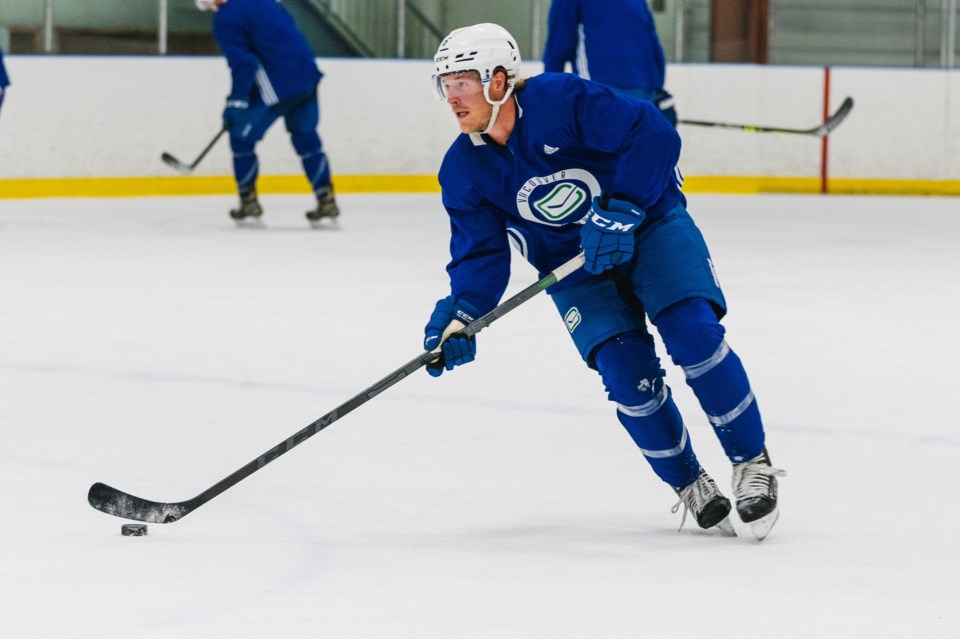This was supposed to be the year.
Brock Boeser entered the NHL with a bang. He scored his at the tail end of the 2016-17 season, then added three more goals in his nine-game audition — a foretaste of what was to come.
His rookie season was a revelation, as Boeser seemingly scored at will. By the All-Star break, Boeser was in the top ten in NHL goalscoring with 24 goals in 46 games. At All-Star weekend, Boeser , then followed that up by .
Boeser looked like he was the NHL's next great sniper and was on pace to break the 40-goal barrier but his season ended just short of 30. He had 29 goals when he was checked into an open door at the bench, fracturing a vertebra.
Even still, it seemed obvious that Boeser would score 30 goals in a season at some point — that never seemed in question. It was more of a question if he would score 40 or 50 goals. But after five NHL seasons, Boeser still hasn’t reached that mark.
Boeser has yet to have a 30-goal season
There are many reasons why Boeser has never hit 30 goals. There were freak injuries that not only caused him to miss large chunks of the season but also affected his ability to shoot the puck. There was a global pandemic that shortened two seasons, including one in which he was 100% healthy, didn’t miss a game, and led the Canucks in scoring. Then there was the mental toll of his father’s illness and passing last season.
This season, however, was supposed to be different. He entered the year brimming with confidence, saying, “This is the year,” when asked about scoring 30 goals.
It hasn’t gone as planned.
So far, Boeser has just 8 goals in 32 games. With the games he’s already missed to injury, he’s definitely not on pace for 30 goals; he’s not even on pace for 20 goals.
What went wrong?
There are some mitigating factors. First, he suffered a hand injury during training camp that was not fully healed by the time he made his return for the start of the season, then missed some games when the scar on his hand opened up. He’s also bounced around the lineup at even strength and rotated on and off the top power play unit with Andrei Kuzmenko.
But the truth is that he simply hasn’t played as well as he has in previous seasons.
The worst defensive season of Boeser's career
Boeser’s overall game has taken a beating. His adjust expected goals percentage (xGF%) is 40.57%, indicating the Canucks are getting badly out-chanced when he’s on the ice at 5-on-5. That’s the worst mark of his career by a wide margin — his career low was 46.85%.
It’s not quite the worst among Canucks forwards — Curtis Lazar and Jack Studnicka are both below him — but it’s a clear sign that something isn’t right.
It’s largely his defensive game. In the three seasons prior to this one, Boeser averaged 2.51 expected goals against per 60 minutes of ice time at 5-on-5 (xGA/60). This season, he’s averaging one more expected goal against per hour, with a 3.49 xGA/60, the worst among Canucks forwards and the worst rate of his career.
In the microdata being tracked by Cam Charron, . He’s below average in zone exits, zone entries, and retrievals on the forecheck, all of which play a large role in macrodata like corsi percentage or expected goals.
With Boeser struggling defensively and in puck possession, it’s not surprising that he hasn’t been afforded as many offensive opportunities.
But here’s the thing: Boeser is getting better.
Boeser's small improvements
Since the start of December, Boeser has a 51.06% xGF% at 5-on-5, as the Canucks have been once again out-chancing their opponents when he’s on the ice. His xGA/60 has dropped to 2.79 since December 1 — still worse than his average over the previous three seasons but better than it was earlier in the season and one of the best among Canucks forwards in that time.
He’s also scoring goals a little bit more frequently. He went his first 11 games without scoring a goal. Now he has four goals in his last nine games — not what anyone would call a hot streak, but more in line with the scoring rate of a 30-goal scorer.
There's room for more improvement. He's still too dependent on linemates to retrieve the puck on the forecheck and along the walls, when he's shown that he can be an effective player in board battles in the past. Even now, on the power play, that is a strength of his game — he's an expert at retrieving rebounds and making smart plays to keep possession in the offensive zone. He needs to translate that same skill to his even-strength play.
This hasn’t been anywhere near the type of bounce back season that some were expecting from Boeser and he still has a long way to go. He would need to score 22 goals in the next 38 games to score 30 goals for the season and that’s a tall order.
So far, Boeser is failing to live up to his new, three-year, $6.65 million contract, as well as the expectations he set for himself. He needs to significantly change the narrative over the second half of the season.
It starts with improved defensive play, which is what the Canucks truly need right now more than goalscoring. If Boeser can prioritize that and get back to where he was in recent seasons with his two-way game, the puck will spend less time in the offensive zone when he's on the ice, and the goals should come with time.




